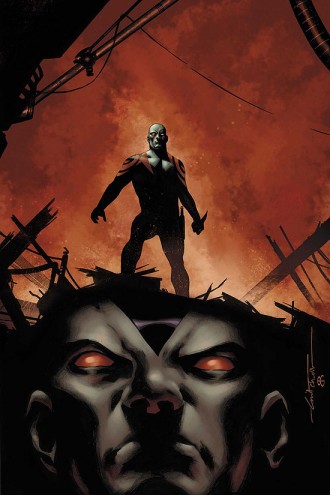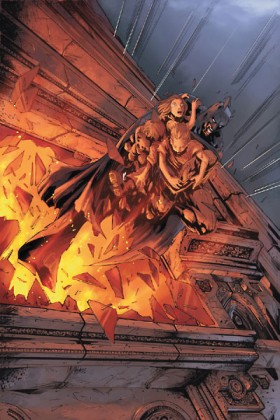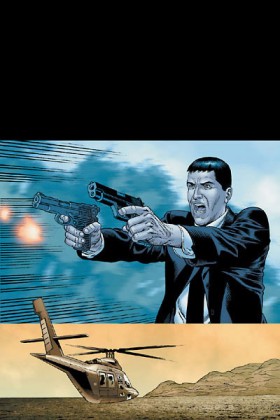|
The
Fanboy Planet Preview Spotlight 09/28/05
brought to you by Brian's Books of Santa
Clara
Each
week we look through the upcoming releases to offer our two
cents as to what's hot and what's not. You can agree with
us or not, but spend your money wisely.
Drax the Destroyer
#1
writer: Keith Giffen
artist: Mitch Breitweiser
In the tiny
town of Coot's Bluff, Alaska, not much really happens. All
that will change once evil rears its ugly head, or in this
case, heads. The only thing that will stand between Coot's
Bluff and total destruction is an anti-social girl and the
alien that may come to love her.
Before that
happens, though, Keith Giffen has to take us to an alien
prison ship, one that holds some vaguely familiar figures
and a few new ones. They mock each other and then turn on
the one that doesn't seem to belong: Drax the Destroyer.
An Earthman
killed then resurrected (brain-damaged) years later for
use in the war against Thanos, over the years Drax has become
a joke. So it takes a writer like Giffen with the sensibility
to play the laughs but remind us how high his stakes are.
Without his
Defenders partner J. M. DeMatteis, Giffen skews darker.
Though characters like the Power Skrull may be elicit chuckles
- "Skrulls do not skulk; they reconnoiter," he huffs more
than once - Giffen never strays to far from the fact these
are killers. Worse, they're mass killers.
How Drax ended
up among them is never explained. Heck, who Drax is never
quite gets explanation, either. But that's one reason this
mini-series makes such an impressive debut. You don't
need to know his history. Perhaps this spins out of Giffen's
Thanos, but if that's true, it's still not germane
to the plot. This book stands on its own.
It's hard to
avoid this kind of speculation, but it stands on its own
as a film concept. Remove Thanos and this could be a completely
self-contained story.
Part of that
comes from the creation of the Coot's Bluff citizenry. They're
real; they're bored. They're looking for the kind of excitement
that an alien invasion might bring them.
On the flip
side, the aliens don't want to be there. They know what
terrors Earth holds for them. Do not attract attention on
a world with Marvel's superheroes. Unfortunately for them,
they're traveling with one.
Drax himself
is proverbially smarter than he looks. He only talks like
Lenny; when he gets mad enough, he can become George without
losing any of his strength. He's not exactly an anti-Hulk,
but the comparison could be made.
And then there's
a new artistic find, or relatively new, anyway. New exclusive
artist Mitch Breitweiser makes the most of this fairly high
profile. His art is reminiscent of Kevin Maguire's without
being derivative, and he really captures the mood of the
story. Take a look at this book if only to see a fresh new
artist on the rise; you're going to want to see more of
him.
That's not why
you should buy it, though. Get Drax the Destroyer
because it's a well-written, well-drawn title that is accessible,
funny and just a little bit threatening. Kind of like Giffen
himself...
Runners-up:
Batman: Journey
Into Knight #2: Okay, it took an issue to get past the
legend of Year One. Andrew Helfer has made this "first
year" story much wider in scope, and actually raised a valid
question about Bruce Wayne's crusade against crime. He's
not the first to do it, but he might be the first you've
read. Tan Eng Huat's art gets more assured this issue, and
so the mini-series ends up being readable if not earth-shatteringly
memorable.
Black Widow:
The Things They Say About Her #1: Marvel has wisely
brought back novelist Richard K. Morgan to follow up his
excellent take on Natasha Romanov. After pretty much up-ending
what little the character knew about herself, Morgan sets
up consequences we didn't even think about. The first mini-series
was taut and suspenseful; this looks like more of the same.
And that's a good thing.
Daredevil
#77: In the midst of all the chaos, Matt Murdock proves
himself a moral man. Brian Michael Bendis has been almost
more interested in the effects of the superhero on those
around him than on the superhero himself, but the approach
works well in this arc. There's still some fight scenes,
but again, this arc is clearly about the human cost.
Defenders
#3: I've already raved about Giffen once this week.
So let me rave about DeMatteis and Maguire as well. They
get their sex jokes in, but again they still make this a
classic Defenders kind of menace. Only with a strong sense
of humor, which has been sorely lacking. They haven't made
the Defenders the a-holes of the Marvel Universe; it just
took their brilliance to notice these characters already
were.
Jack Cross
#2: Like Howard Chaykin, Warren Ellis refuses to let
comics eat themselves alive in a spandex suburb. Jack
Cross is another complex thought-provoking action book
that reads like an airport suspense thriller. What makes
it so unmistakably Ellis is an idiosyncratic take on its
lead character -- a tough as nails bastard that still seems
almost liberal. And yes, it has an actual point of view
and a slightly chilling take on post-9/11 realities.
Neil Gaiman's
Neverwhere #4: Each issue has been beautiful, spinning
out of the mind of Gaiman but channeled through Mike Carey.
At last, we have comics to illustrate the vision that the
BBC series just could not quite capture. To say the least.
New Warriors
#4: Zeb Wells has been pretty low-key since he started
writing comics, but every one I've read by him has been
fun and quirky. It's quite possible that New Warriors
fans hate this book, but I can tell you that the original
run left me cold. THIS take makes me want to read more.
The Sentry
#1: The Golden Guardian of Good. The Righteous Rip-off
of Superman. Call him what you will - Bendis was right to
bring him back in New Avengers and Jenkins was right
to write this mini-series with John Romita, Jr. If all goes
well, this won't be a rehash of the original great mini-series.
Hey, write to us and
let us know what you think. Talk about it on the
forums!
|








